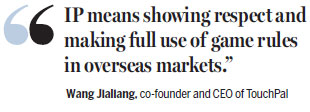TouchPal fights for intellectual property
As TouchPal has grown from a high-tech startup to a global leader in keyboard technology, its Chief Executive Officer Wang Jialiang attributes the rocket-fuelled growth to intellectual property's role.
"For me, IP means showing respect and making full use of game rules in overseas markets," he said in a recent interview.
After graduating with a master's in electrical engineering from Shanghai Jiao Tong University in 2005, he joined Microsoft China as a project manager.
When smart phones became increasingly popular worldwide, their default clumsy keyboards still limited users' experiences. In 2008, Wang sensed a growing market.
He quit his job and cofounded TouchPal with his friends in Shanghai that year. They launched an innovative virtual keyboard, offering many enhancements and shortcuts.
Due to the co-founders' previous work experience in foreign-funded businesses, TouchPal was targeted at English text-messaging markets in the very beginning.

"At that time, many domestic users thought we were a US company," Wang said, citing a Chinese user who suggested the company develop a Chinese-version of TouchPal and offered to teach them Chinese in an English letter.
In the year following its founding, TouchPal won the award of mobile innovation at the Mobile World Congress, the largest annual gathering for the industry in Barcelona, Spain.
"Many overseas visitors came to our exhibition booth and told us 'we have different views on Chinese companies because of your performance'," Wang recalled.
With their core technology at the forefront of the industry worldwide, Touch-Pal saw rapid market expansion, which was noticed by industrial giant Nuance in the United States.
After its acquisition offer was rejected, Nuance, then the largest smart phone keyboard service provider in the world, filed a patent case with a US federal court and a Section 337 investigation complaint with the US International Trade Commission in 2012.
Section 337 investigations usually focus on intellectual property infringement claims.
Wang said he was shocked at the estimated legal cost quotation from his attorney, about $3 million to $5 million for each patent, of which the case involved five.
He was eager to reach a settlement.
"I was misled by the movie American Dreams in China," he said. In the movie, three young men start up their business and are challenged by US officials, but win their case.
Yet in reality, the Chinese entrepreneur with the same dream was turned down.
The first round of talks took just five minutes after 10 minutes of greetings, Wang said.
"Nuance's representative said they need no patent licensing fees nor plans for a settlement. All they wanted was to push us out of the US market."
In the second round, a couple of months later, Wang was on crutches due to a sprained ankle, only to find the counterpart hadn't even shown up.
"They just gave us a call, saying that their position remains unchanged."
TouchPal gathered evidence and asked five top experts in the industry in the US to provide expert testimony against Nuance.
"We had gained overwhelming advantages," Wang said.
In the third round, the situation turned around - Nuance asked for a settlement. Wang said his attorney persuaded him to accept the offer, as he wanted to end the fight as quickly as possible.
"Investment in IP needs a long-term perspective," he said. "Without IP developed in 2008, we could not have prevailed in the case."
"Among Chinese CEOs, I might not be the most handsome, but I must be the one that knows the most about IP," he joked.
He studied IP law at school and helped to make patent filings at Microsoft. "When we raked in the first 1 million yuan ($145,128), we spent 400,000 yuan on patents."
Currently in cooperation with more than half of the top-10 smartphone manufacturers in the world, Touch-Pal's keyboard has served more than 400 million users in some 120 countries, using over 100 languages, according to the company.
While China is campaigning for mass innovation and entrepreneurship, a growing number of budding entrepreneurs are following Wang's suit in their overseas expansion.
wangxin@chinadaily.com.cn
(China Daily 11/23/2016 page17)








